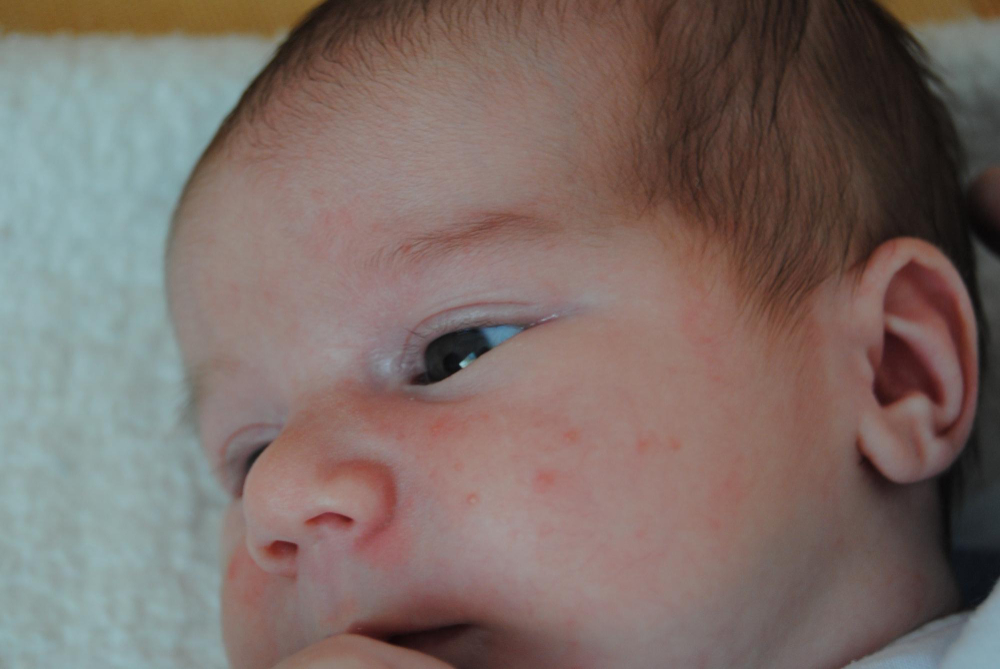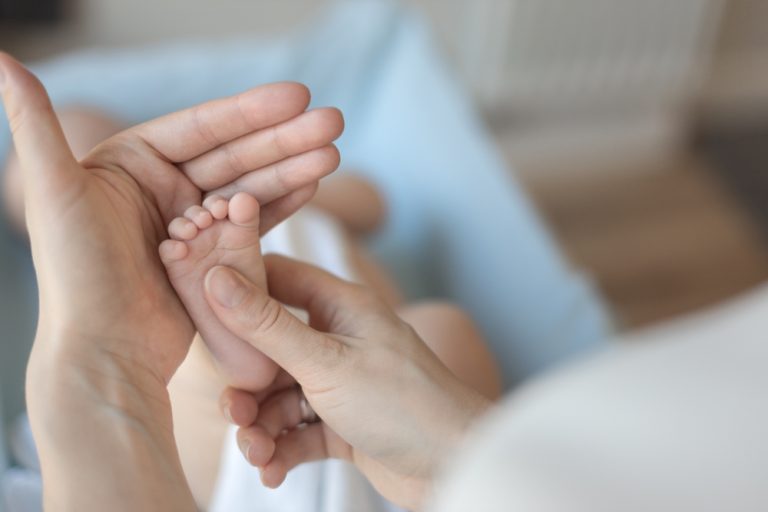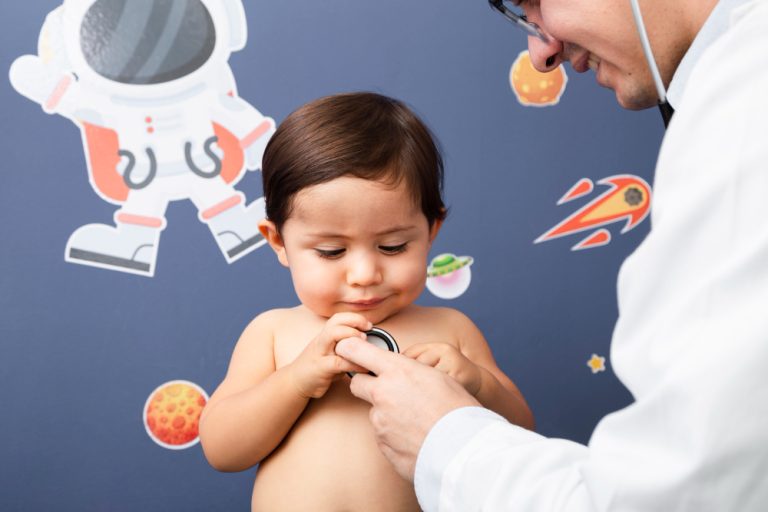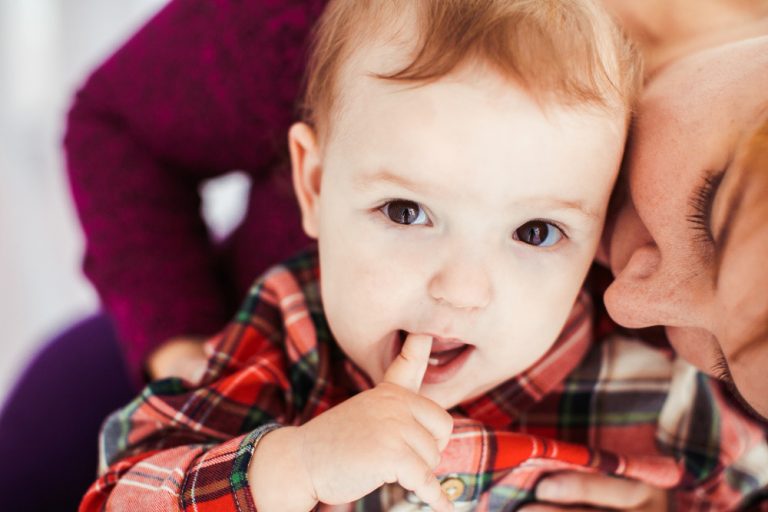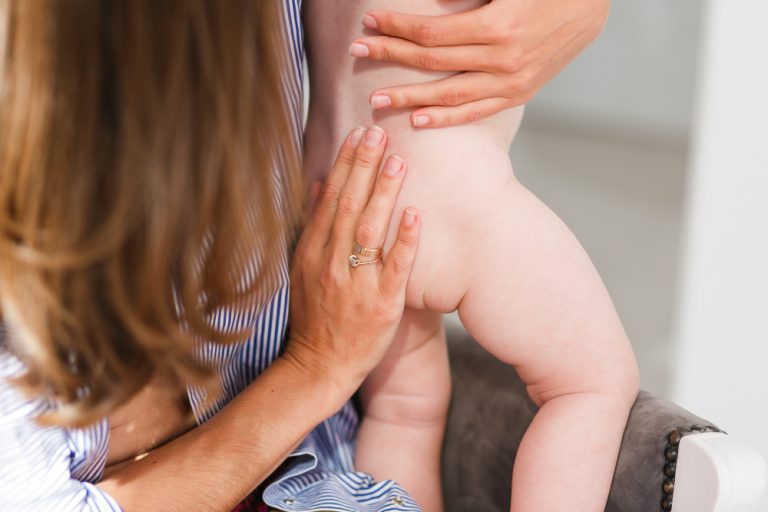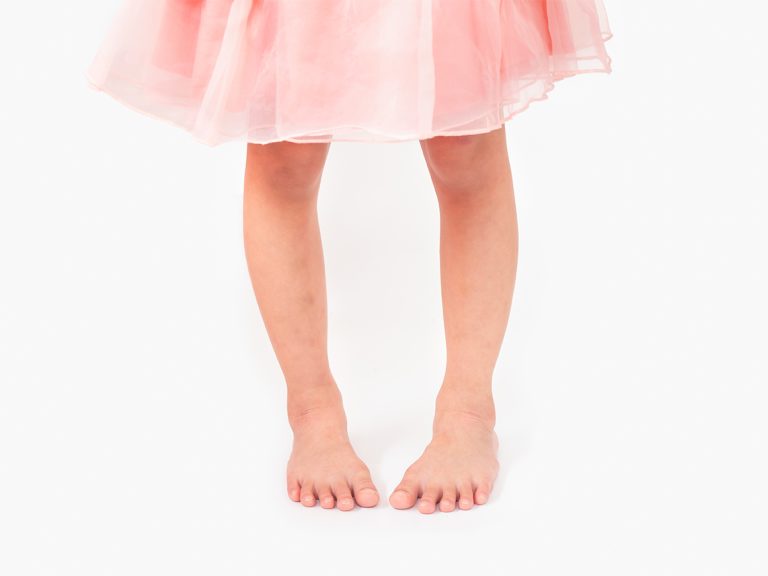How to Get Rid of Baby Acne: Causes, Prevention, & Treatment
Are you a new parent, over the moon with the arrival of your precious bundle of joy, only to find yourself facing the unexpected challenge of baby acne? How to get rid of baby acne? Rest assured, this journey is shared by countless parents. Discovering baby acne on your little one’s delicate skin can be distressing, but worry not!
We’ve put together a comprehensive guide on ‘How to Get Rid of Baby Acne’, packed with essential information and practical tips to help you understand and manage this common skin condition in infants.
Understanding Baby Acne
- What causes baby acne, and how long does it typically last?
- What are the common symptoms to look out for in your newborn’s delicate skin?
Prevention and Care Tips
- How can you effectively prevent flare-ups and alleviate symptoms of baby acne?
- What at-home remedies and practices can you adopt to promote healthy skin for your baby?
Treatment Options
- When should you seek medical advice for baby acne?
- What are the best treatment options recommended by healthcare providers to tackle baby acne?
Venture on this enlightening journey to gain invaluable insights into baby acne and equip yourself with the knowledge required to care for your baby’s delicate skin.
Introduction to Baby Acne
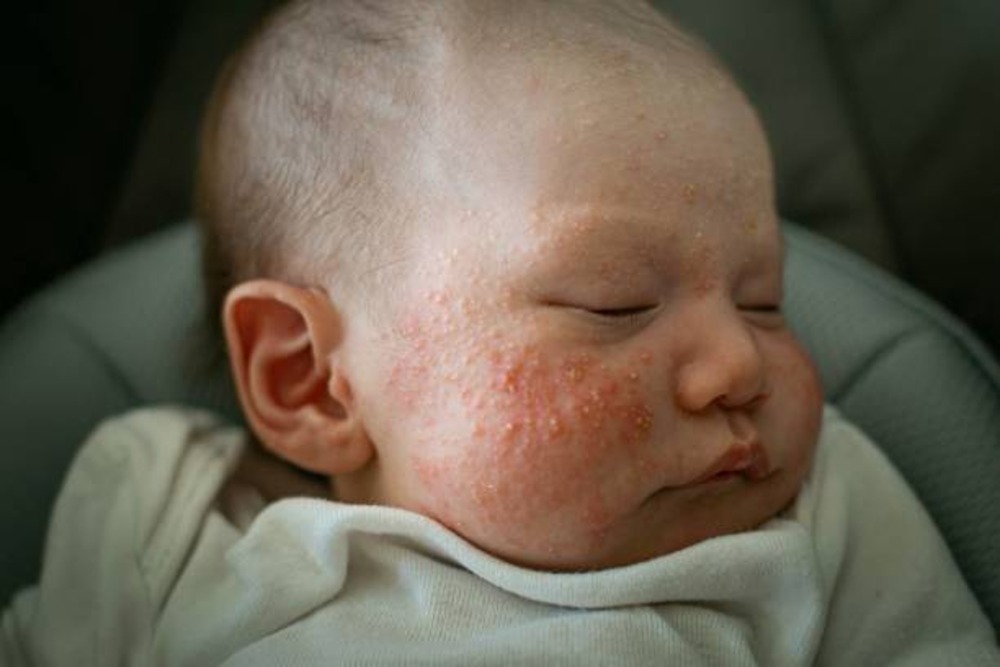
Baby acne is a common skin condition that affects many newborns. It is characterized by tiny red or white bumps that can appear on a baby’s face, particularly on the cheeks, chin, and forehead. While baby acne is generally harmless and temporary, it can still cause concern for parents.
This skin condition is quite prevalent, often occurring in about 20% of newborns. It usually emerges within the first few weeks of life and can persist for a few months. It is important to note that baby acne is different from other skin conditions, such as milia or infantile acne.
The exact cause of baby acne is not fully understood, but hormonal influence is believed to play a role. During pregnancy, hormones from the mother can stimulate the baby’s oil-producing glands, leading to acne breakouts after birth. Additionally, the newborn’s underdeveloped skin and immature immune system may contribute to this condition.
While baby acne may cause aesthetic concerns for parents, it is essential to remember that it is a temporary and self-resolving skin issue. It does not typically result in scarring or cause long-term harm to the baby’s delicate skin.
Parents should avoid picking or squeezing the acne, as this may lead to further irritation or potential infection. Instead, focus on maintaining good overall skin hygiene for your little one and be patient as the acne resolves on its own.
What Causes Baby Acne?
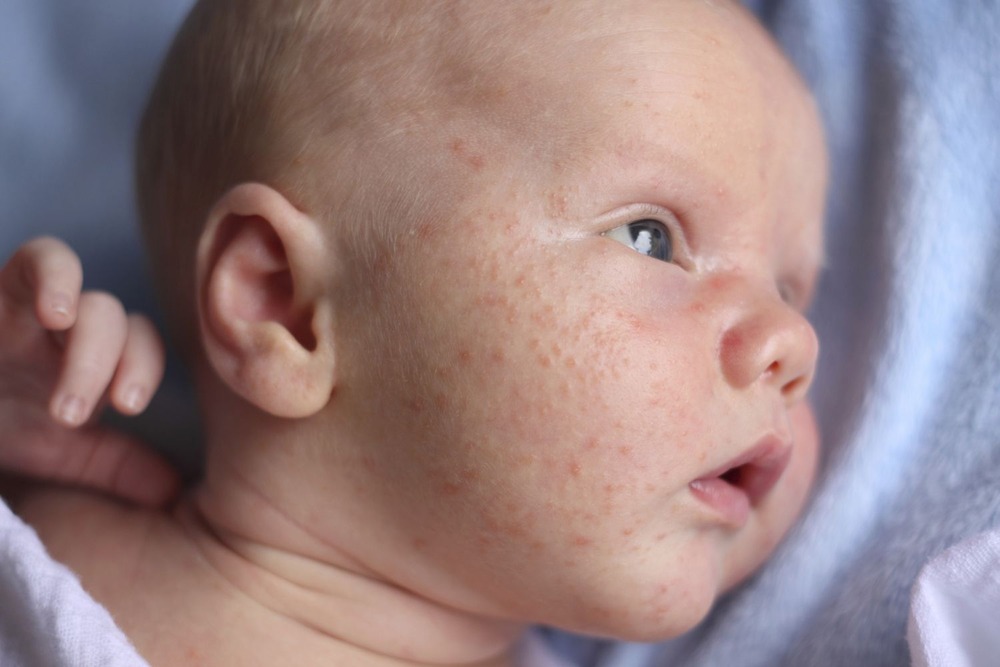
Baby acne, also known as neonatal acne, is a common skin condition that affects newborns. While it may cause concern for parents, it is essential to understand the various factors that contribute to baby acne.
Here are the potential causes that can lead to those tiny red bumps on your little one’s delicate skin:
Hormonal Influence
- During pregnancy, a mother’s hormones pass through the placenta to the baby.
- These hormones can stimulate the baby’s oil-producing glands, known as sebaceous glands, to become overactive.
- As a result, excess oil is produced, leading to clogged pores, inflammation, and the development of acne.
Skin Characteristics
- Newborns have sensitive and delicate skin that is still adapting to the external environment.
- Their skin is more prone to irritation and clogged pores, which can contribute to the appearance of baby acne.
- Additionally, the presence of vernix, a waxy substance that protects the baby’s skin in the womb, can also contribute to clogged pores.
Maternal Lifestyle Habits
- Some studies suggest that maternal lifestyle habits and diet during pregnancy may play a role in the development of baby acne.
- Although more research is needed, certain factors, such as the mother’s consumption of certain foods or medications, may potentially influence the baby’s skin health.
It is important to note that baby acne is a temporary skin condition that typically resolves on its own within a few weeks or months. While it may be concerning to witness, it is a normal part of a newborn’s development.
However, if you have any concerns or the symptoms persist or worsen, it is always a good idea to consult your baby’s healthcare provider for further evaluation and guidance.
Remember, baby acne is not a sign of inadequate cleanliness, and vigorously cleaning or scrubbing the affected area can further irritate the skin.
Instead, adopt gentle skincare practices and allow your baby’s skin to breathe freely. Your baby’s skin will regain its natural beauty with time, patience, and proper care.
Understanding the Symptoms of Baby Acne
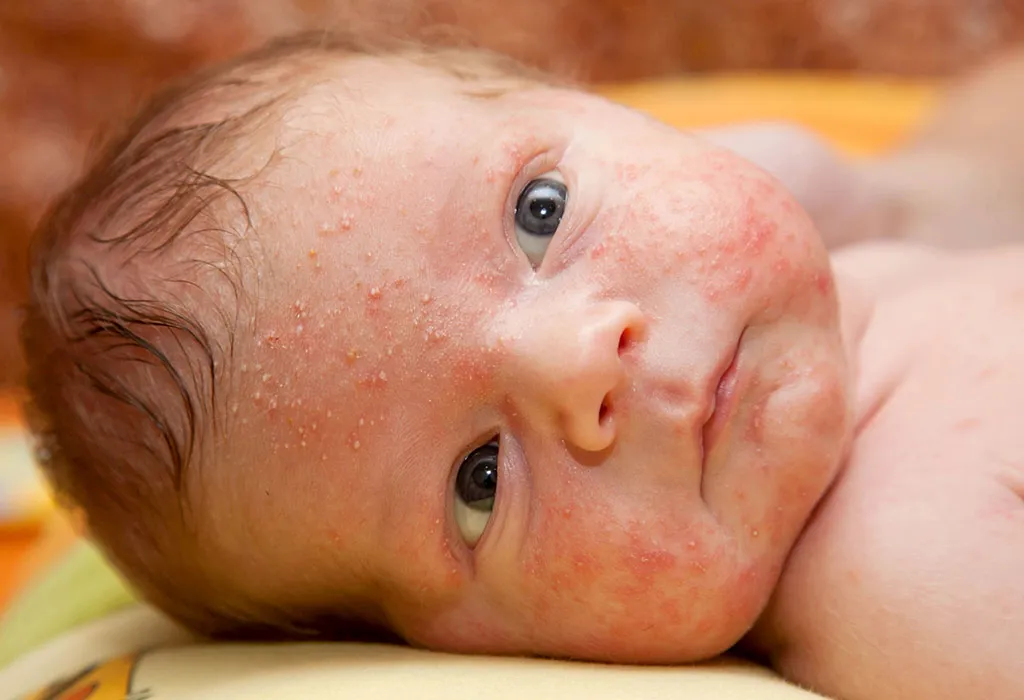
Baby acne is a common skin condition that affects many newborns. It typically appears as small, red bumps or pimples on the baby’s face, particularly on the cheeks, nose, and forehead. These blemishes can also manifest as whiteheads or blackheads. Unlike other skin conditions, baby acne does not cause itching, pain, or discomfort for the baby.
- One key characteristic of baby acne is its temporary nature it usually resolves on its own without any treatment within a few weeks or months.
- Additionally, baby acne is not associated with permanent scarring.
- However, it’s important to note that baby acne may resemble other skin conditions such as eczema or an allergic reaction.
- It’s crucial for parents to consult a healthcare provider for an accurate diagnosis.
While baby acne may be concerning for parents, it’s vital to remember that it is a harmless and self-limiting condition that does not require any specific medical intervention. By understanding the distinctive visual features of baby acne, parents can confidently differentiate it from other skin conditions and ensure their baby’s skin remains healthy and well-nurtured.
Sources:
4 Tips for Managing Baby Acne: How to Get Rid of Baby Acne
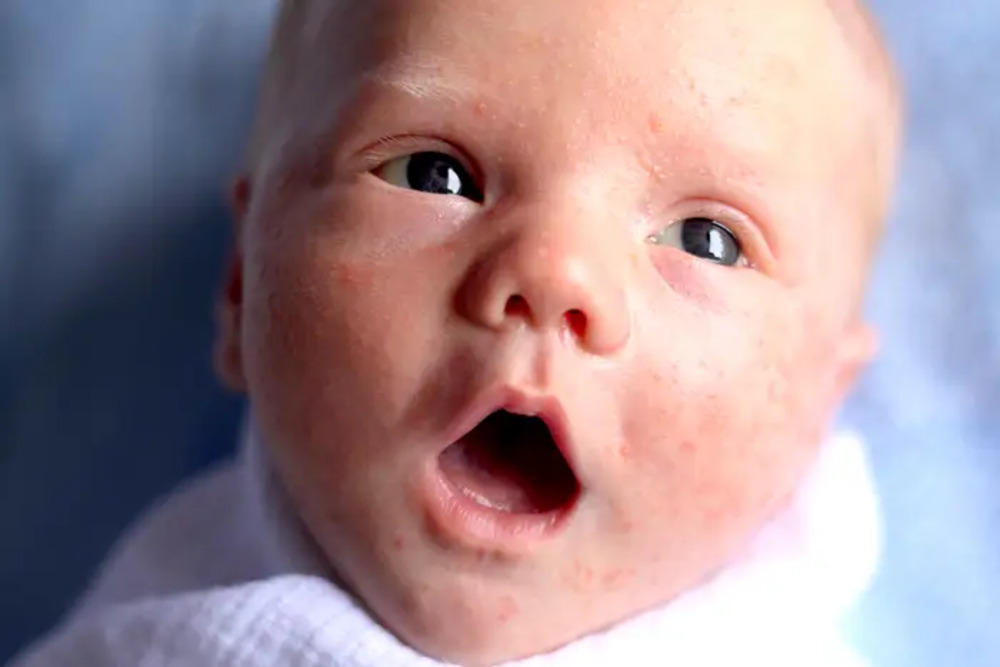
When it comes to managing baby acne, there are several practical tips and guidelines that parents can follow to alleviate symptoms and prevent flare-ups. By adopting these gentle and effective practices, you can promote healthy skin for your precious little one.
Here are some recommendations:
1. Gentle Cleansing
- Cleanse your baby’s face gently with a mild baby cleanser or simply with warm water.
- Use your clean hands or a soft washcloth to gently cleanse the affected areas.
- Avoid scrubbing or harsh rubbing, as it can further irritate the skin.
- Pat the skin dry with a soft towel, being careful not to cause any friction.
2. Avoid Harsh Products
- Steer clear of heavily scented soaps, lotions, and creams, as they can exacerbate baby acne.
- Opt for gentle, fragrance-free products specifically formulated for babies.
- Avoid using adult acne treatments or harsh chemicals on your baby’s delicate skin.
3. Promote Healthy Skin Practices
- Ensure that your baby’s skin is kept clean and dry throughout the day.
- Dress your baby in loose-fitting clothing made from breathable fabrics.
- Avoid overdressing or using too many layers, as this can trap heat and sweat, potentially worsening the acne.
- Opt for natural fibers such as cotton to allow the skin to breathe.
4. Be Mindful of Contact Irritants
- Be cautious about the materials that come into contact with your baby’s skin, such as blankets, towels, or clothing.
- Choose fabrics that are gentle and hypoallergenic.
- Wash these items using mild, fragrance-free detergents to reduce the risk of any irritants triggering a reaction.
Remember, baby acne is a temporary condition that typically resolves on its own within a few weeks to months. It’s important to avoid picking or squeezing the acne, as this can lead to scarring or infection. If you have any concerns or if the acne persists or worsens, it is always a good idea to consult your baby’s healthcare provider for further guidance and support.
By following these how to get rid of baby acne tips and incorporating healthy skincare practices into your baby’s routine, you can help alleviate and prevent baby acne flare-ups, ensuring your little one’s skin stays healthy and beautiful.
Home Remedies and Natural Treatments: How to Get Rid of Baby Acne
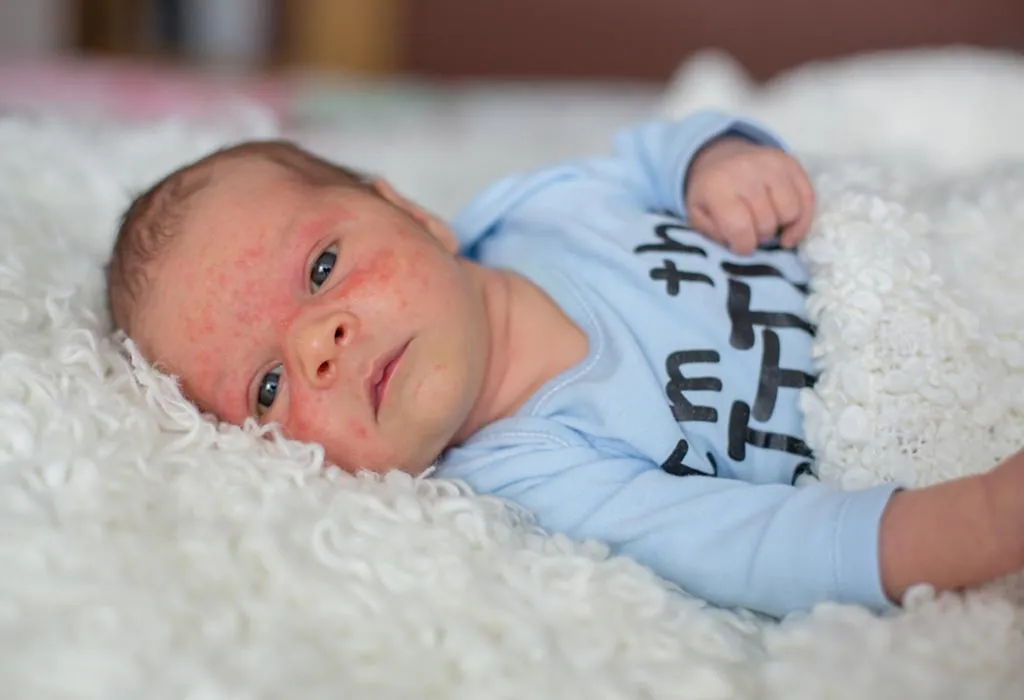
When it comes to soothing baby acne and promoting clear skin, there are several safe and effective home remedies and natural treatments that parents can try. These remedies aim to alleviate the symptoms of baby acne without causing any harm to your little one’s delicate skin.
Here are some options to consider:
1. Breast Milk
- Breast milk has natural antimicrobial and anti-inflammatory properties that can help soothe baby acne.
- Apply a small amount of breast milk directly onto the affected areas and pat dry gently.
- Breast milk can also help moisturize the skin without clogging the pores.
2. Warm Water
- Using warm water to cleanse your baby’s face can help remove excess oil and dirt without causing irritation.
- Avoid using hot water, as it can strip the skin of its natural oils and worsen the acne.
- Use a soft, clean cloth to gently cleanse the affected areas.
3. Sensitive Skincare Products
- Opt for gentle, hypoallergenic skincare products specifically designed for babies.
- Look for products that are free from harsh chemicals, fragrances, and dyes.
- Remember to perform a patch test before using any new product on your baby’s skin.
4. Avoid Overwashing
- While it’s important to keep your baby’s face clean, overwashing can actually worsen the acne.
- Stick to washing the affected areas once or twice a day with a mild cleanser or warm water.
- Avoid scrubbing or using rough washcloths, as this can irritate the skin.
5. Natural Oils
- Some natural oils, such as coconut oil or tea tree oil, may have anti-inflammatory and antimicrobial properties that can help soothe baby acne.
- However, it’s crucial to dilute these oils properly and perform a patch test before applying them to your baby’s skin.
Remember, baby acne is usually a temporary condition that resolves on its own. If you have any concerns or if the acne persists or worsens, it’s always a good idea to consult your baby’s healthcare provider for further guidance and support.
When to Seek Medical Advice
Ensuring the well-being of your baby is a top priority, and knowing when to seek medical advice for baby acne can provide peace of mind. While baby acne is generally a harmless and temporary condition, there are certain situations that warrant consulting a healthcare provider.
Here are some guidelines to help you determine when it is appropriate to seek medical advice:
1. Persistent Symptoms
- If your baby’s acne persists beyond the usual timeframe of a few weeks or shows no signs of improvement, it may be beneficial to consult a healthcare provider.
- They can assess the severity of the condition and recommend appropriate treatment options.
2. Severe Breakouts
- In some rare cases, baby acne can become severe, with widespread inflammation and discomfort.
- If your little one’s acne is causing significant distress or impacting their daily activities, it is advisable to seek medical attention for personalized advice.
3. Concerning Symptoms
- If you notice any concerning symptoms alongside baby acne, such as pus-filled lesions, bleeding, or signs of infection, it is crucial to reach out to a healthcare provider promptly.
- They can evaluate the situation and provide guidance on appropriate interventions.
Remember, healthcare providers are experienced in diagnosing and treating various skin conditions in infants. They can offer valuable advice tailored to your baby’s specific needs. If you have any doubts or concerns about your baby’s acne, don’t hesitate to consult with a healthcare professional. Their expertise can provide reassurance and ensure your baby’s skin health.
The Final Note: How to Get Rid of Baby Acne
To sum up, dealing with baby acne can be a source of concern for many parents, but it’s important to remember that this common condition is temporary and typically resolves on its own. By understanding the causes, symptoms, prevention methods, and treatment options discussed in this comprehensive guide, you are now equipped with the knowledge to care for your baby’s delicate skin and address the issue of baby acne.
Remember to always seek medical advice if you have any concerns about your baby’s skin. By following the recommended prevention and care tips and being patient, you can effectively learn how to get rid of baby acne and help your little one achieve healthy, glowing skin.

